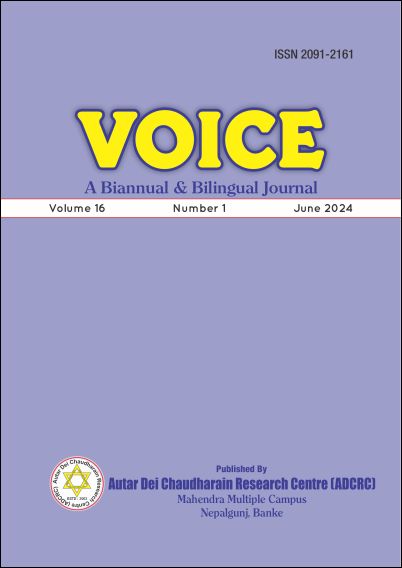Examining Realism and Societal Dynamics in Selected Novels of Shashi Deshpande
DOI:
https://doi.org/10.3126/voice.v16i1.67418Keywords:
Feminist Consiousness, Modernity, Patriarchy, RealismAbstract
This research investigates the literary corpus of Shashi Deshpande, employing a qualitative and analytical approach. The primary focus lies on seven of her novels: "That Long Silence," "The Dark Holds No Terrors," "Roots and Shadows," "A Matter of Time," "The Binding Vine," "Little Remedies," and "Moving On." These works serve as the foundation for an examination of themes within contemporary Indian society, specifically with the aim of examining how her novels depict the interplay between literary realism, social dynamics, and the evolving nature of the family unit. The research is further enriched by consulting secondary sources, including scholarly articles and books, to provide a comprehensive context. Deshpande's portrayal extends beyond mere social critique. The study delves into how she addresses the challenges faced by women and children within the family structure, without advocating for its dismantling. By integrating Max Weber's perspectives on modernity within the Indian context, the research seeks to illuminate the internal struggles of her characters as they navigate the tensions between tradition and progress. The analysis reveals a critical exploration of persistent societal issues in India. Deshpande's characters serve as conduits to highlight often-overlooked societal problems, actively seeking solutions within a framework that acknowledges both cultural heritage and individual agency. Notably, a thematic shift is observed across Deshpande's works. Her earlier novels tend to focus on gender and the quest for personal autonomy, while her later tetralogy explores the transcendence of societal limitations by characters who strive to build strong and enduring familial foundations. By analyzing these trends, the study identifies common obstacles faced by urban middle-class families in India. Ultimately, it argues for the necessity of dismantling structures of injustice and oppression as a crucial step towards achieving a more just and equitable modern society. Furthermore, the research posits the creation of new social frameworks that dismantle traditional barriers and foster social cohesion as a potential path towards progress.
Downloads
Downloads
Published
How to Cite
Issue
Section
License
Copyright (c) 2024 The Author(s)

This work is licensed under a Creative Commons Attribution-NonCommercial 4.0 International License.
CC BY-NC: This license allows reusers to distribute, remix, adapt, and build upon the material in any medium or format for noncommercial purposes only, and only so long as attribution is given to the creator.




